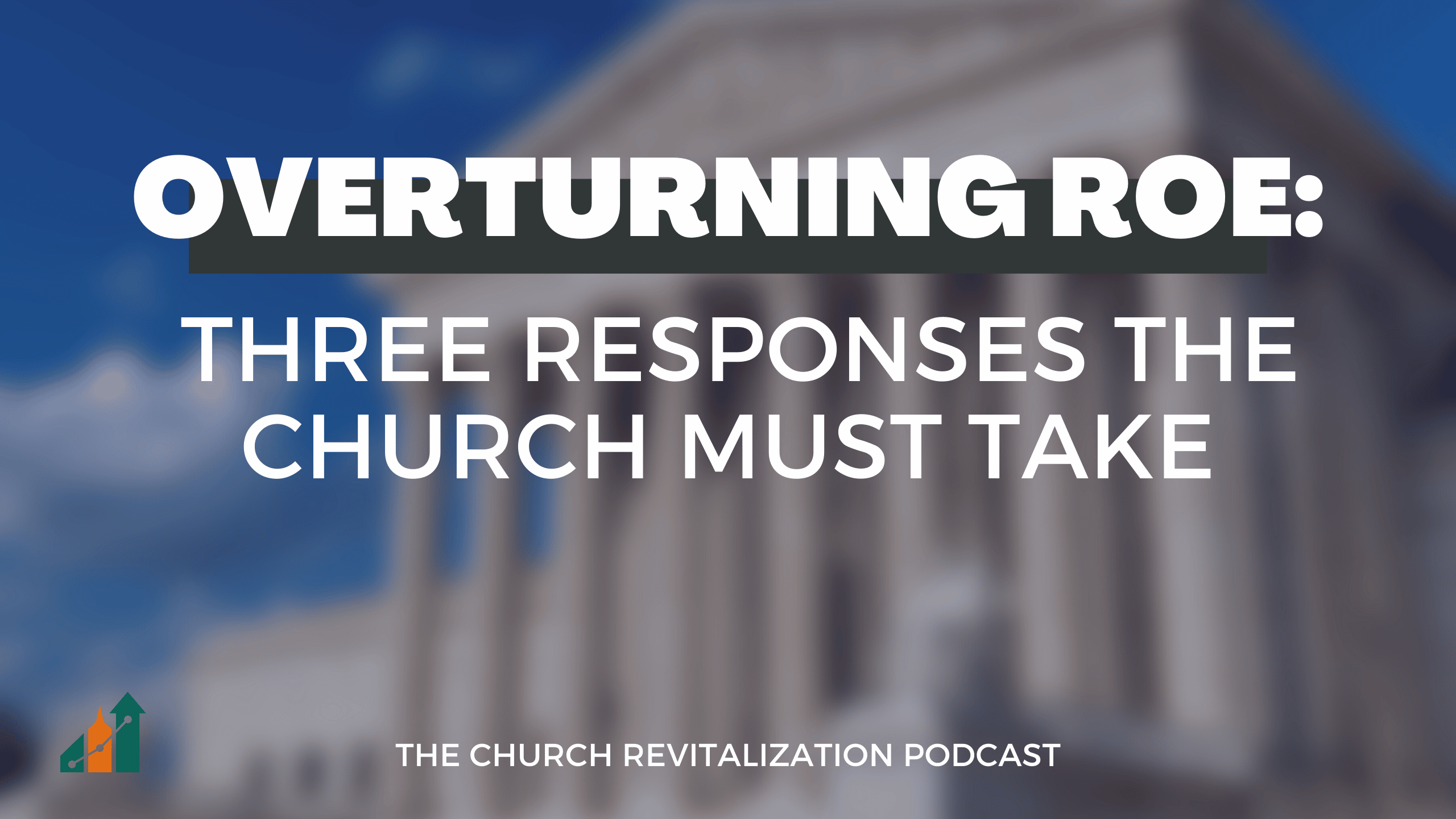The Church Revitalization Podcast – Episode 146
Friday, June 24, 2022 will be a date long remembered as the nearly 50-year precedent of upholding abortion as a constitutional right in the United States was overturned. 50 years. That’s a long time. So long, in fact, that it may be a case in which most never really thought the day would come. I think that may be the case with most churches. Since the “leak” back in May of the potential outcome that came to be, I have not heard much about churches preparing to meet the needs of women and children born into a new legal reality in our country. I think in most cases, last Friday’s announcement has taken the Church by surprise. “What do we do now,” I’m afraid, is still not the question that Church leaders are asking, and it needs to be.
We (evangelical Christians) have gotten what we asked for. Now we must walk the talk and truly show the love of Christ to those whom we swore we cared about. We’ve said that we care about women, and life, and children, and families. The world is watching. Will we prove it now?
This week on the Church Revitalization Podcast, we looked at three areas of response that the Church must take now to show that we truly do care about people and not just winning an argument.
Congregational Communication
We must celebrate life while being mindful of people’s pasts. When speaking on the topic of abortion in church, we must always assume that at least one person in the room has been touched by this great tragedy. It may be a woman who made that choice, or the parents of someone, or even a father. The last thing we need to do is apply scorn or shame.
Because of the Lord’s great love we are not consumed, for his compassions never fail. They are new every morning; great is your faithfulness. Lamentations 3:22-23
Repentant hearts are deserving of our support and love. Some of the greatest advocates for life in our chuches are women who previously had abortions. They should have a place (if they want one) in helping churches develop communication strategies and programs around supporting life.
Subscribe below to never miss an episode.
[podcast_subscribe id=”8838″]
Congregational Support
There are numerous tangible ways in which the Church can support life in this new era. The items listed below are essential in caring for women and children. These can’t be future plans. The future is now. Abortion appointments are being cancelled in some states as I write this because of changes in the law. Those women need help now. The church needs to treat pregnancies like natural disasters – be prepared when disaster strikes, and be ready to mobilize to care for those affected. There is no time to wait.
- Pregnancy support – Many churches support pregnancy centers, and pregnancy centers have been a valuable resource for women when investigating what their options may be. In some parts of the United States now, abortion is no longer an option, so pregnancy centers will be inundated with women seeking care and answers. Meet with the leadership of your local pregnancy center and find out what their new financial needs will be. Also find out what new services and resources they are planing to provide.
- Adoption support – This is an area in which churches can provide both internal and external support. If your local pregnancy center does not have a good resource partner for adoption, encourage them to develop such a relationship. Better yet, help them do that. Without abortion, there are two options for a pregnancy now; keep the baby or place it for adoption, and adoption is not cheap. There are pregnancy expenses that women incur such as doctor appointments. There are costs for case workers that facilitate the relationship between birth mothers and adoptive families. The cost of having a baby in a hospital is very high and often health insurance does not cover it if the mother is insured at all. These are the reasons that adoptions now cost anywhere from $15,000 to over $50,000 or even $70,000! Supporting an adoption ministry that makes the costs very low by having external donors is a great way for the church to support adoption, but there is also nothing keeping the church from accumulating an internal adoption fund of its own.
- Post-Birth support – Women who choose to keep their baby may face significant financial and emotional needs. The church should be good at providing both. This has been a rallying cry from the liberal left for years. They say that Christians will not be there to support women who keep their babies. Will we prove them wrong? Will your church have diapers, formula, baby food, clothing, car seats, cribs, toys, and money for doctor appointments, food, and maybe even options for housing?
- Foster care support – The unfortunate reality is that some babies will be born into an environment in which they may be taken away from their mothers for a time or permanently. Will the Church be there to support foster families? All the same needs listed above will be required.
Congregational Culture
Churches have a track record of pretending that unplanned pregnancies don’t happen in the church. It’s common for a girl in the youth group to “take a break” if she gets pregnant, or for the family to move to another church. This is not the biblical way to handle these kinds of situations.
The church in Corinth had a sin problem, and Paul’s encouragement was to cast the offending member out of the congregation. But the issue at hand was a lack of repentance. When a person confesses and repents, the church has an obligation to respond with the grace, kindness, and forgiveness of Jesus.
Your church will inevitably have women who become pregnant unexpectedly. Examine your church’s culture–not just its policies and procedures. How can your church walk women through this journey so that they experience redemption and reconciliation, rather than shame and financial ruin.
The world at-large is looking for the Church to fall short of its ideals; for the Church to only care about “fetuses” and not about the women and children. We know that we do care about the least of these. Let our communication, resources, and congregational culture be a bold witness for Christ, revealing our love and compassion for the most vulnerable in society within every phase of life. In this way, we will be above reproach and bring glory to our Lord.
Watch this episode on YouTube

A.J. Mathieu is the President of the Malphurs Group. He is passionate about helping churches thrive. A.J. lives in the Dallas/Ft. Worth Metroplex, enjoys the outdoors, and loves spending time with his wife and two sons. Click here to email A.J.


